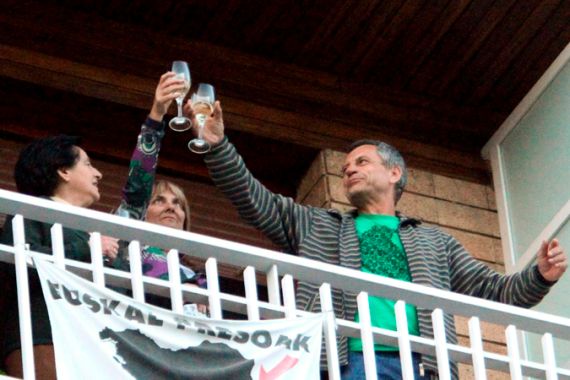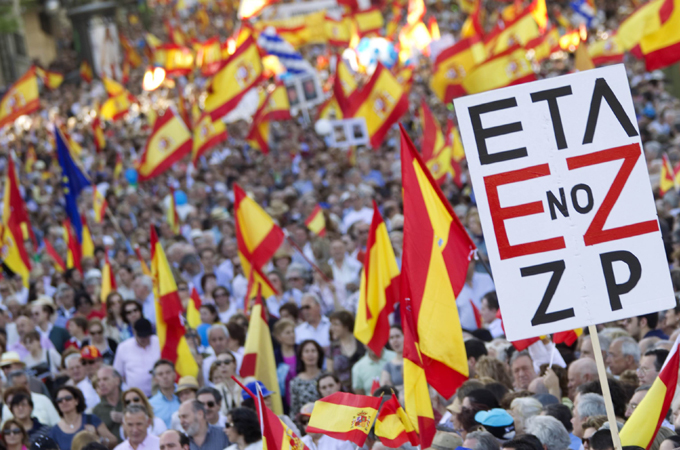ETA announces end to 40 years of extortion
Follow the ETA ceasefire announced in January, the cancelled “revolutionary tax” is promising but many remain sceptical.

 |
| Basque separatist group ETA, after announcing a permanent ceasefire in January and making moves to participate in legitimate elections, has also been facing resistance with some who prefer they not be allowed to participate [REUTERS] |
The Confebask business association in northern Spain reported that it received a letter from the armed Basque separatist group ETA, announcing the cancellation of “the revolutionary tax” that it has charged businesses over the last 40 years.
Confebask groups 13,000 companies in the three Basque country provinces: Álava, Biscay, and Gipuzkoa.
A few hours earlier, the business associations in the neighbouring northern Spanish community of Navarra, who have suffered the same extortion, stated in a press conference that they had received similar letters, stamped in France, in which ETA (Euskadi ta Askatasuna, or “Basque Fatherland and Freedom” in the Basque language), explained that the end to the “tax” formed part of the unilateral ceasefire it had declared in January.
The ceasefire and the condemnation of violence by the Batasuna party, the political wing of ETA, and other Basque nationalist organisations like Bildu and Sortu, which are seeking legal status in order to field candidates in the next elections, are generating hopes of peace throughout Spain.
Nevertheless, scepticism prevails in broad segments of the population and in most political parties, which remember all too well how the last ceasefire – of a total of 11 declared by ETA since 1981 – ended in 2006.
On Dec. 30, 2006, after nine months of talks with the government of socialist prime minister José Luis Rodríguez Zapatero, ETA set off an explosion that demolished the five floors of the car park in the Madrid airport, killed two Ecuadorian workers – Carlos Alonso Palate and Diego Armando Estacio – and injured 30 people.
The attack put an end to ETA’s ceasefire and to the prospect of talks that did not set a requisite for the complete dismantling of the group and the laying down of its weapons.
Earlier talks with ETA carried out by each democratic government in power since dictator Francisco Franco’s death put an end to his 36-year regime also ended in violence.
But this is the first time that the terrorist group has included in its ceasefire an end to the extortion of businesses in the autonomous communities of Basque country and Navarra. The payments were collected, from France, through a sophisticated network of intermediaries and dummy companies in tax havens, by means of threats of violent attacks against the business owners’ property or death threats against them and their families.
After ETA carried out its first attack in June 1960 – a bomb in the San Sebastián railway station that killed 22-month-old Begoña Urroz – it tried to finance its terrorist activities by means of bank robberies.
But the robberies posed risks and led to arrests. Ten years later it abandoned that tactic, and set up a broad network of extortion of large, medium and even small companies, while carrying out numerous kidnappings, some of which ended in the victim’s death.
In December 1970, West German consul Eugen Beihl became the group’s first kidnap victim. He was followed by a list of 76 prominent victims who brought the group millions of dollars in ransom. They included businessman Emiliano Revilla, who was held captive for 249 days, and Julio Iglesias Puga, the father of singer Julio Iglesias, who was found alive after two weeks.
The government of the autonomous Basque community, which is governed by prime minister Zapatero’s Socialist Party (PSOE) with the parliamentary support of the centre-right People’s Party (PP), said the letters were a good sign, although it called on ETA to announce once and for all that it was disbanding.
It also urged people to “keep their guard up” – interpreted as advice for the hundreds of politicians, businesspersons and public figures who are protected round the clock by bodyguards in the Basque country, some of whom had announced their intention to ease their vigilance in the new climate created by the ceasefire.
Less optimistic, PP spokesman in the Basque country Leopoldo Barrera said “the only meaningful development would be the definitive disappearance of ETA”.
Navarra governor Miguel Sanz, the leader of the Union of Navarra People, said that the ETA communiqué was “good news”, but said it should be taken with a grain of salt “and in the broader context”.
The context he was referring to is the weak state of the terrorist group and the aim of its political arms – Batasuna, Sortu and Bildu – to take part in the May 22 municipal elections.
Observers familiar with the modus operandi of ETA and its Basque nationalist political allies say it is no coincidence that the ceasefire and cancellation of the “revolutionary tax” have coincided with the armed group’s moment of greatest weakness and discredit.
Never in its 50 years of history has ETA been as hemmed-in as it now. More than 600 of its leaders and militants are in prison, its attempts to reorganise in Spain, France and Portugal have been thwarted, many of its safe houses and arms caches have been discovered, and more and more business owners had been refusing to give in to extortion.
A version of this article first appeared on Inter Press Service news agency.